Orrin Jason Bradford's Blog, page 16
December 23, 2013
One of the Books that Started it All
I read a post this morning by my good friend and fellow writer, Joseph D’Agnese as he shared about the books of a children’s book author named Clifford B. Hicks. As Joe wrote: “He [Clifford B. Hicks] wrote a series of books about a kid named Alvin Fernald, who was sort of the MacGyver of the kid world. With a toothpick, a piece of string and leftover jelly sandwich, Alvin could build a contraption to save the world.”
It reminded me of some of the books I’d been given by my next-door-neighbor, Mrs. Crabtree, the children’s 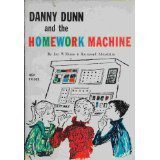 librarian in Raleigh, N. C. The only one that I remember at the moment by name is: Danny Dunn and the Homework Machine. I read several others in the series before moving on to Edgar Rice Burrough’s John Carter of Mars series and the Tom Swift Jr. books, but for some reason this one stuck deeply in my memory. I guess the idea of having a machine that could do your homework was just to super cool to forget.
librarian in Raleigh, N. C. The only one that I remember at the moment by name is: Danny Dunn and the Homework Machine. I read several others in the series before moving on to Edgar Rice Burrough’s John Carter of Mars series and the Tom Swift Jr. books, but for some reason this one stuck deeply in my memory. I guess the idea of having a machine that could do your homework was just to super cool to forget.
I was pleased to learn that the Danny Dunn series were written by two real authors and not a team of ghostwriters, like the Tom Swift books had been. Those two authors were Jay Williams and Raymond Abraskin. I also learned from Wikipedia that, though Abrashkin died in 1960, he is listed as co-author of all 15 books of this series, which continued from 1956 until 1977. Now, that leaves a very warm place in my heart for Jay Williams.
I’m also clear that the positive impact these YA book series had on me is a prime reason I decided to start my own YA fantasy series with Dominion Over All — the first in the Zak Bates Eco Series. It’s kinda cool to think that a few decades from now some entrepreneurial author might be sharing with his readers how Dominion Over All inspired him to become an avid reader and later a writer. One can dream, right?
It’s Your Turn
What are some of the books that turned you into an avid reader and why? If you’re also a writer what books and/or authors have inspired you to write? I’d enjoy hearing from you.
December 21, 2013
Call Out for Beta Readers
(If you are an avid reader and aspiring writer, don’t miss my ‘sweetening the pot’ offer below.)
I’m a writer on a mission today — to attract Beta Readers. I’m searching for 2-4 people who enjoy reading speculative fiction (fantasy and science fiction, etc.). Read on to see if we might create a win-win collaboration.
You see, over the past twenty-five plus years I’ve always been a prolific writer, but I’ve not always been as prolific a publisher, in large part because as I learned recently I’m more wired up to be a writer than an author. You can read more about this distinction made by Dean Wesley Smith on his blog, but briefly here’s my take on it:
Writers write. Authors are writers who have written, and who often spend much more of their time trying to get what they’ve written published by trying to find the perfect agent who will then help them find the perfect publisher, etc. Writers on the other hand prefer using their writing as their primary marketing tool. We write, polish, edit, publish and then get on with the next story and/or book, then rinse and repeat.
So, as a primary ‘writer’ who this past year decided the best way for me to publish is as an indie publisher, I now have several works, some that I’ve written years ago and others that I’ve started recently, that I want to polish, revise, have edited and then indie publish.
Today I’m interested in attracting beta readers who would enjoy reading my latest work of visionary fiction – Babble. (Read a synopsis of Babble Here.)

Future Beta Reader?
A key step to this process is to have some other people who can read and comment on the various writing projects. That’s where another important set of distinctions come in — the difference between an Alpha Reader, Beta Reader, and Gamma Reader. This set comes from my all time favorite writing podcast, Writing Excuses. To learn more about the differences of these three kinds of readers, listen to Writing Excuses fifteen minute podcast on the subject, but basically here’s the difference as I see it:
Alpha Readers can see the Big Picture of the story or book even while it’s in its formative stage. They can help a writer to birth the idea without taking it off course. My wife, Ann, is really good at this and is my primary Alpha Reader along with my writing buddy, Cynthia.
A Beta Readers is able to read for the ‘Big Picture’ as well once it’s further along. A Beta Reader helps the writer to focus on such important elements as:
Character Development
Plot
Description
Dialogue
Conflict
A Beta Reader is also able to not get mired down by such details as punctuation, spelling, typos, grammar, etc. Those are the types of important details that a Gamma Reader and/or editor will pick up and clean up.
So, one of the reasons for writing this post is to attract additional Beta Readers to my visionary writer team. If you’re reading this post, you may either be one of my future Beta Readers or know others who would enjoy being a part of such an endeavor.
So, what makes for a good Beta Reader?
Qualities & Attributes of an ideal Beta Reader
Here are some of the qualities and attributes I feel are most important for a Beta Reader:
A Beta Reader is able to provide constructive comments on books and stories from a Big Picture perspective. They can make useful, valuable, and constructive comments that results in a stronger and more engaging story.
They are able to share what works about the story from their perspective in a possible and specific way focusing on such areas as those listed above.
They are then able to also make specific comments on what could make the story even better. This includes pointing out places in the story where they may have become confused, or where they lost interest, or where the story seemed to ramble.
They are able to communicate their insights in a positive and constructive way.
While being avid readers of many different genres, Beta Readers this team will particularly enjoy reading speculative and visionary fiction and non fiction.
They are also able to read and comment on a book within a week or two of their agreeing to read the book. The exception to this is in the case they are reading chapters as they are being written, which might happen from time to time.
If something unexpected comes up that prevents them from reading the book in a timely manner, they communicate immediately so other arrangements can be made.
I’ve also found that for such an arrangement to work well it must work for all concerned. In other words, there needs to be some kind of an “equal energy exchange.”
The Give & Receive of an Equal Energy Exchange
Let’s start by listing what you as an Beta Reader should be willing to give. A Beta Reader agrees:
To read and comment on at least 1-2 books per year. You are also free to read more than 2 books per year if you like.
To read any book you volunteer for in a timely manner — usually within 1-2 weeks depending on the length of the book. The exception to this time frame would be if you’re reading and commenting on the chapters as they’re being written which will naturally take longer.
To be mindful to make positive and constructive comments that will not only make the books and stories better but will also leave the writer empowered to continue writing.
To make your comments as specific as possible that include highlighting what you like about the book and that you feel works well, as well as specific suggestions that could improve the book and/or story.
To not become overly attached to your comments and insights, knowing that the final say is left to the writer, and that the writer deciding not to make certain recommended changes does not mean the writer does not appreciate and value the comments and suggestions.
Now, here’s what you can expect to receive in return:
The satisfaction of knowing your making a significant contribution to help create books that are engaging, entertaining, inspiring, encouraging and enlightening.
Improving your enjoyment of reading as well as learning more about what could make you a more effective writer as well,
You presence on this web site as part of the writing team that will include your photo and bio along with a link to your own web site if you so choose.
A signed copy of any of the books that you are a Beta Reader for once the book has been published.
Sweetening the Pot: I really want and need some quality Beta Readers, and I find that avid readers and aspiring writers often make the best Beta Readers. So, anyone who is accepted to the team as a Beta Reader will receive a full scholarship/access to the From Spark to Flame Online Writer’s Course (this online course sells for $249). Check it out. I think you’ll find this a very ‘sweet’ offer.
The eternal appreciation of the writer that includes appearing in the acknowledgment section of the book.
Ready to Become a Beta Reader?
It’s simple to do. Just send me a message here. Tell me a little about yourself, what kind of stories you most enjoy reading, why you want to join the team and anything else you feel is important for me to know about you. Also include any questions you may have. I’ll get back in touch with you shortly…usually within the week. If you want to read some of the opening scenes of Babble, Go Here.
December 9, 2013
Got Serendipity? Want More?
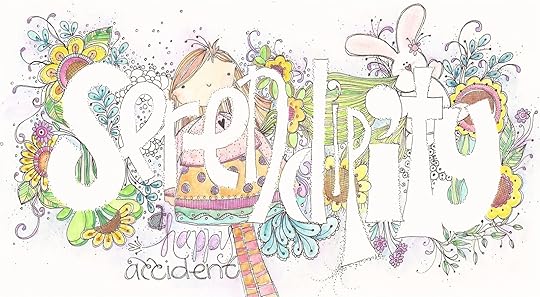 I find the concept of serendipity to be fascinating though often not well understood. According to Richard Eyre in his stellar book, Spiritual Serendipity: Cultivating and Celebrating the Art of the Unexpected, serendipity is “that quality of mind which, through awareness, sagacity, and good fortune, allows one to frequently discover something good while seeking something else.”
I find the concept of serendipity to be fascinating though often not well understood. According to Richard Eyre in his stellar book, Spiritual Serendipity: Cultivating and Celebrating the Art of the Unexpected, serendipity is “that quality of mind which, through awareness, sagacity, and good fortune, allows one to frequently discover something good while seeking something else.”
You could even say that serendipity is the counter-balance to discipline that I wrote about here. As writers, being in the ‘serendipity zone’ can be an awesome experience. For example, one of my writer friends, Joe D’Agnese recently recommended to me Ray Bradbury’s book of essays about the writing life entitled, Zen in the Art of Writing, in which one of his stories clearly indicates the degree to which he often stayed in the serendipity zone.
One perfect example started when his wife and him walked along the beach and came upon the remains of an old pier that looked to Bradbury’s imagination as a dinosaur’s skeleton, so a night or two later he wrote a story about a dinosaur who mistakes a lighthouse fog horn for another dinosaur’s call, who upon finding out the error, dies of a broken heart. Okay, neat story, right?
But that’s really just the beginning. The story appeared in The Saturday Evening Post soon after, and two years later was made into a film.
The story was also read by John Huston who promptly called Bradbury to ask him to write the screenplay for his Moby Dick, which lead Bradbury to serendipitously reexamine the life of Melville and Jules Verne in an essay. When that essay was read by the folks organizing the 1964 New York World’s Fair, they put Bradbury in charge of conceptualizing the entire upper floor of the United States Pavilion.
But his serendipitous journey isn’t over yet. Because of the Pavilion, the Disney organization hired him to help plan the dreams that went into Spaceship Earth at Epcot Center where he crammed in a history of mankind, and of course, he had to include something about dinosaurs as well.
All that from one strange idea that started on that California beach. But it took more than the idea, right? It also took someone who was awake and aware enough to follow that idea to see where it might go — to write down the story, then send the story in, to follow up when the story lead to a movie deal and then a screenplay opportunity.
So, how can we as visionary writers optimize this magical power of serendipity?
Tapping into Serendipity
To answer that question, let’s go back to Eyre’s definition — well, actually he borrowed the definition from Horace Walpole, the eighteenth-century British writer who coined the term, serendipity.
Serendipity: that quality of mind which, through awareness, sagacity, and good fortune, allows one to frequently discover something good while seeking something else.
It starts in the mind by setting an intention to become aware and awake enough to attract to you the conditions that lead to serendipitous events happening on a regular basis. That intention setting includes believing that there is such a thing as serendipity and serendipitous opportunities all around us, and that our job is to maintain “awareness, sagacity, and good fortune.”
Think about it. How many other people walked by the very same remains of that pier over the years — hundreds, maybe thousands. But it was Bradbury and his imagination that started the ball rolling.
I’ve seen the same in my writing careers though not quite at the level of Bradbury (well, not yet anyway). When I was regularly working on Project Purpose: to write and publish articles about people who were living purposeful and meaningful lives, my ability to attract the perfect next purpose profile became uncanny. I remember once interviewing John Robbins for an assignment for Yoga Journal. Towards the end of the interview, he mentioned that his 15-year old son, Ocean, had just started his own non profit called YES.
That little tidbit of information lead me to writing a couple different articles about Ocean Robbins, that then lead to another candidate for Project Purpose. Serendipity doesn’t always work quite so linearly. I certainly didn’t know or even plan to have John provide me with my next story lead, but it happened, then and quite often at other times.
I believe that serendipity can be developed as well. As Bradbury points out in Zen in the Art of Writing, feeding one’s Muse is an important part of increasing serendipity in your life. Such feeding can include doing things to break yourself out of your routines, taking time for Artist Dates, reading outside your normal genres, setting aside special time to ramble and brainstorm new ideas. The more you feed your Muse the more it will return to you great ideas that, with the proper amount of trust and action applied, can lead you into your own ‘serendipity zone.’
Now It’s Your Turn
What ways have you found to increase serendipity in your life? Where has serendipity shown up at just the right time to move you forward in your writing career? What do you feel blocks moments of serendipity? Let me hear from you.
December 6, 2013
The Read Now Pay Later Experiment
I love to write. Well, what I most love is to have written but more and more I’m also enjoying the moments of writing that often slide into several hours. With increasing frequency these writing bouts focus on my visionary fiction whether it’s on the next book in the Zak Bates Eco-Adventure Series, one of my adult speculative fiction books like Freeform or Seeds of a New Birth written under my pen name – Orrin Jason Bradford, or a new series or standalone like my recent NaNoWriMo novel, Babble.
What doesn’t flow quite so naturally (but is also an important part of a writing career) is the process of attracting readers–you know, the marketing and promoting process. However, one thing I’ve learned a number of times from my life on purpose coaching is a great way to bring more focus and fun to an area of life is through purposeful play:
Purposeful Play – Working on a project, goal, or task in such a way that you’re willing to play and experiment with it while having a particular plan or intention. The secret to purposeful play is being committed to a particular result or outcome without being attached to that outcome.
Creating experiments that are in some way connected to a particular project or intention can be great fun. For example I’ve decided to create the Read Now Pay Later Experiment.
The Read Now Pay Later Experiment
It works quite simply. For a limited time you can download one of the books that’s part of this project/experiment for free, read it (for free) and after reading it go to the link you’ll find in the book and pay what you feel the book was worth. Of course, if you hated the book you might decide not to pay anything, but if you really enjoy it you might pay $5, or $7 or more. You’ll also find a link on the same page where you can go to review the book which would be almost as positive an act as sharing a few coins with me. (Notice, I wrote ‘almost’ – the ideal would be to do both).
The first book I’m making available in this way is Freeform. I really like this book. It was fun to write and I’ve enjoyed going back and reading the completed edition of it as well. Here’s the basic story line:
Something strange is happening in the North Carolina mountains. Pat Vogt, formerly of B.I.U.F.O., the Bureau of Investigation of Unidentified Flying Objects knows it. In fact, she was forced to retire from her position as part of a massive government cover up. She’s also the only person to ever be inside an alien vessel, as well as almost being killed by its inhabitant.
Dr. Allan Pritcha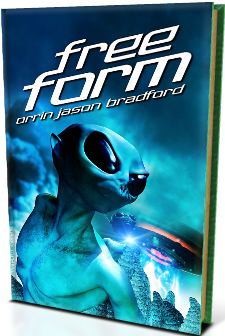 rd, Wayneboro’s small animal veterinarian also knows it, when a late night C-section of a giant mongrel dog results, not in a litter of pups, but a litter of 8-inch long larvae. While all but one of the strange larvae dies, the remaining one first morphs to look like a puppy, then transforms again to look identical to Allan’s son, Todd, who was killed along with Allan’s wife in a tragic house fire accident.
rd, Wayneboro’s small animal veterinarian also knows it, when a late night C-section of a giant mongrel dog results, not in a litter of pups, but a litter of 8-inch long larvae. While all but one of the strange larvae dies, the remaining one first morphs to look like a puppy, then transforms again to look identical to Allan’s son, Todd, who was killed along with Allan’s wife in a tragic house fire accident.
Local hunter, Bo Strickland, also knows it’s the strangest deer season he’s ever seen as the abundant wildlife of the area seems to be infested with maggot looking larvae the size of a football. And whatever happened to his hunting companion?
Dr. Fredric Homlin, president and owner of Biogentrix, is the one most aware of the strange happenings around Waynesboro because he’s the instigator of it all. It’s all part of his master plan to take over the world for ‘his kind.’
Why Am I Conducting this Experiment?
I mean, after all, I’m a professional writer and author with over twenty-five years of writing experience during which I’ve sold hundreds of articles and quite a few books, so why would I be willing to give you one of my books up front with the hope and prayer that you’ll come through after reading it and pay me?
It’s simple. I’m in a new stage of my writing career where one of my major goals is to become a successful and profitable writer of fiction novels. I believe in what I’ve written and I believe that if I can get these books into readers’ hands most of them will like them and not only be willing to pay a few bucks for them but might also spread the word to their friends.
Available in PDF, Kindle and Epub Editions
You can request your copy of Freeform in the edition of your choice:
FreeForm (PDF edition)
FreeForm for the Kindle (mobi edition)
FreeForm (epub edition)
Important! Upon reaching the shopping cart page enter the coupon code # 031692 to receive your book for free.
Remember you’ll pay nothing up front. I won’t even ask you for your credit card information. Just download and get to reading. Once you finish, go to the link you’ll find in the book to pay what you feel is fair and then review it online as well. Simple, easy, and I trust you’ll find it’s a win-win transaction.
Open to Your Feedback
What do you think of this experiment? Does it seem fair? Can you think of a way to make it better? My inquiring mind wants to know. Please share your thoughts, questions and comments below.
December 3, 2013
Commentary On: The Bestsellers Lab Guide for Authors
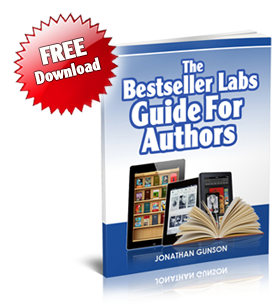 I recently started reading Jonathan Gunson’s free PDF book, The Bestsellers Lab Guide for Authors. (It’s free — you ‘pay’ with just you name and email address so why not zip over and pick up your own copy? Then we can discuss other points here as well.) I’m finding it both affirming (that I’m doing a lot of the things he recommends) and gap creating (there’s more ground to take in developing my author career and platform). Today I want to focus on one particular area where I feel I’ve made some progress and yet there’s more ground to take.
I recently started reading Jonathan Gunson’s free PDF book, The Bestsellers Lab Guide for Authors. (It’s free — you ‘pay’ with just you name and email address so why not zip over and pick up your own copy? Then we can discuss other points here as well.) I’m finding it both affirming (that I’m doing a lot of the things he recommends) and gap creating (there’s more ground to take in developing my author career and platform). Today I want to focus on one particular area where I feel I’ve made some progress and yet there’s more ground to take.
Under his section, Three Steps To Building Your Author Platform, he lists the following steps to take to gain visibility for your books:
Step 1 – Choose your genre and define your reader
Step 2 – Define your unique author brand
Step 3 – Share the ‘World Around Your Story’ with your community
Oops! Kuplump… I stumbled on the first step. Over the years I’ve written in different genres and for different 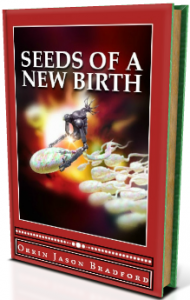 groups of readers. My Zak Bates Adventure Series (that started with Dominion Over All) is fantasy for a middle school audience, while Seeds of a New Birth is a high-tech thriller
groups of readers. My Zak Bates Adventure Series (that started with Dominion Over All) is fantasy for a middle school audience, while Seeds of a New Birth is a high-tech thriller 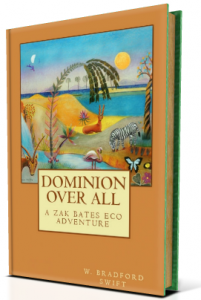 definitely for adults only. (If you’re wondering why, just look at the picture on the cover and compare it to the Dominion Over All cover. Yes, those are ‘super seeds’ on the cover.
definitely for adults only. (If you’re wondering why, just look at the picture on the cover and compare it to the Dominion Over All cover. Yes, those are ‘super seeds’ on the cover.  ) That’s why I chose to publish it and FreeForm under the pen name Orrin Jason Bradford. But then there’s also my most popular non-fiction self help book, Life On Purpose: Six Passages to an Inspired Life and the follow up Spiral of Fulfillment: Living an Inspired Life of Service, Simplicity and Spiritual Serenity.
) That’s why I chose to publish it and FreeForm under the pen name Orrin Jason Bradford. But then there’s also my most popular non-fiction self help book, Life On Purpose: Six Passages to an Inspired Life and the follow up Spiral of Fulfillment: Living an Inspired Life of Service, Simplicity and Spiritual Serenity.
So you can see how authors with many interests can have a real challenge with step one. But it gets worse because these steps build upon each other. Defining your unique author brand assumes you’ve chosen one genre and have defined your reader for that genre. And of course, step one and two are all in preparation for step three – sharing the ‘World Around Your Story’ with your community.
One Solution to this Dilemma
As I read this section of Jonathan’s book I felt a tightening in my chest and a familiar dialogue with myself. “But I write in a number of different genre’s and for different audience. Does this mean my writing career is doomed from the start?” Well, of course, time will tell on that question so I decided to read on a bit further:
Now, having said that, the fact is you don’t have to write in just one genre, but as you can see, if you do it will massively raise your chances of success.
Oh, thank God. There’s still hope, even if only a sliver. Then the sliver grew into a slice when I read his next set of questions:
So what’s your author ‘elevator pitch’? In a sentence, how would you describe to a potential reader the type of books you write?
I realized I had the makings of my author’s elevator pitch by looking at what most if not all my stories had in common — what was the larger umbrella under which they could all rest comfortably. It goes like this:
I write visionary fiction and non-fiction – books and novels that both entertain and enlighten.
That’s good for even the shortest elevator ride, right?
For the longer rides I might expand it a bit to:
I write visionary fiction and non-fiction – books and novels that both entertain and enlighten, that inspires the reader to live their own lives on purpose.
When I look at my body of work up to this point (including those in the queue) through this lens, I see they all fit pretty well under this description. I can also see that keeping this in mind will help direct my future work as well.
So, if you are an eclectic writer, take heart and look a little deeper at the common elements of your work to date.
And Now It’s Your Turn
What would you say your author’s elevator speech is? If you’re more of a reader than a writer, what would your reader’s elevator speech be if you found yourself trapped in a tiny room slowly ascending or descending with another reader?
What methods have you found that work well in building your author’s platform and a community of avid readers?
I’m still wondering how to take step two and three. What would you suggest? (Johnathan, care to weigh in on this one?  )
)
November 25, 2013
Writing Groups Work (when you work them)
We were originally called the Project Purpose Writing Team but then, when we outgrew that name, we became the Visionary Writers On Purpose Team. We met weekly on the phone via teleconferencing and we’d share our writing projects, our successes, our failures, and our breakthroughs. We varied in number from a half dozen to a dozen or more scattered all over the country (including Canada).
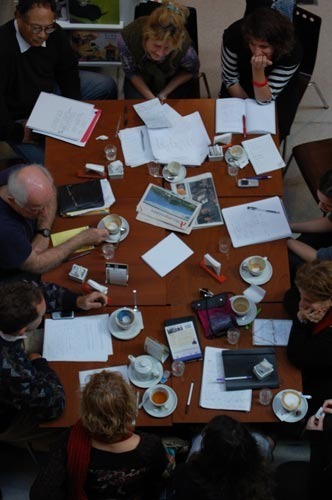 And we wrote. We wrote magazine articles. We wrote poetry. Several of us began writing books, mostly nonfiction though several of us had dreams of writing fiction as well. We met for over four years, if memory serves me (which it often doesn’t these days). Members came and went, and yet there was a nucleus that stayed true to the team from the beginning (and I thank you for that).
And we wrote. We wrote magazine articles. We wrote poetry. Several of us began writing books, mostly nonfiction though several of us had dreams of writing fiction as well. We met for over four years, if memory serves me (which it often doesn’t these days). Members came and went, and yet there was a nucleus that stayed true to the team from the beginning (and I thank you for that).
Eventually, when it had more or less fulfilled its purpose, we disbanded, but not before several of us became published for the first time, one member purchased her own magazine, another became an editor of a prominent magazine in her region. I published my book, Life On Purpose: Six Passages to an Inspired Life, which went on to be an award winning finalist in the Self-Help: Motivational division of the Best Books 2007 Awards sponsored by USA News. (It was beat out that year by a little book entitled The Secret. Not bad company to keep.)
I share all this because I believe strongly in writers working together whether you have a writing buddy with which you meet regularly or a group of fellow writers. Writing groups work when you work them. They can help you stay motivated and inspired to continue writing. They can help you create a big gap for yourself. They can instill confidence in your ability, not only to write, but to keep on keeping on when the rejection letters pour from your mail box (or email box) like a waterfall of ‘no’s.’
Revitalizing Visionary Writers On Purpose
I share this not only to inspire some of you reading this to start your own writing group, but to invite you to help me revitalize the Visionary Writers On Purpose Team. Well, I know it won’t be the same team, won’t even have the exact same purpose or vision, but I still like the name so I’m reclaiming it.
The new 2013-14 version of the VWOP Team is for fellow visionary writers of fiction and non-fiction. Remember, visionary fiction entertains while also enlightening and encouraging the reader to live their own life on purpose. If you love a good nonfiction book that both enlightens and encourages you in your life while also being entertaining, that’s visionary nonfiction.
Revitalizing the Visionary Writers On Purpose team is one of the steps I’m taking to let the world and the rest of the Universe know my commitment to my writing career. Another is writing regular blog posts. Interested in joining me? By the way, this go around we’ll be using Google Hangouts for our monthly gatherings. Technology continues to grow and we grow with it (or we’re left behind by it).
My goal is to have at least 4 other qualified team members (and no more than 8) ready to start meeting monthly by January 1st, 2014 (and earlier would be fine as well).
The next step is to complete a simple ‘application’ form which will let me know you’re interested. I’ll then be in touch to explore if we’d be a good match. Apply By Clicking Here. (BTW – clicking this link will redirect you to my other site — Life On Purpose Institute — where I keep my online forms.)
November 19, 2013
Layer Your Way to Writing Success
Several years ago I decided while living in Massachusetts I decided to take some art classes. While my original plan was to take oil painting classes, after meeting with one of the art instructors and viewing samples of his pastel paintings, I knew it was time to learn a whole new medium.
 I remember watching my instructor painting a still life prior to my first class. I began to think I’d made a mistake. Maybe the pastels I’d seen belonged to another artist, for the one he was painting looked more like an abstract picture of the bowl of fruit in front of him — a splotch of yellow in the general vicinity where the banana should be, another of red representing the apple, a series of small purple circles. Really, they’re supposed to be grapes, huh?
I remember watching my instructor painting a still life prior to my first class. I began to think I’d made a mistake. Maybe the pastels I’d seen belonged to another artist, for the one he was painting looked more like an abstract picture of the bowl of fruit in front of him — a splotch of yellow in the general vicinity where the banana should be, another of red representing the apple, a series of small purple circles. Really, they’re supposed to be grapes, huh?
But then as I continued to watch something amazing transpired right before my eyes. After getting the basic shapes and colors down, he went back and started to fill in a few details and then a few more. Suddenly, in the last ten minutes the entire painting pulled together like an out of focused photograph being brought into focus by the turning of a dial.
An Insight from NaNoWriMo 2013
In the early days of this year’s NaNoWriMo I realized writing a work of fiction, whether it’s a short story, novella or novel could be viewed in the same way. Rather than trying to get every word perfect from the very beginning, why not work in layers as my art teacher did.
For example, as I write my first draft of Babble (my NaNo project) I don’t have to worry about getting every word, sentence, paragraph or chapter perfect. Instead, I want to focus on getting the basic plot and storyline down. This gives me the opportunity to get to know my characters and how they’re going to interact with each other.
As with most of my stories, I’ve determined in the planning and research phase what my opening scene will be and at least a basic idea what the climatic ending is. From there, it’s up to my characters to guide me on how to fill in the gap between these two points.
After I finish the first draft, I’ll set the manuscript aside for a few days, letting it simmer a bit on the back burner. Then I’ll tackle the next layer, during which I’ll focus on expanding the descriptions of scenes and characters. I may also start moving some of the scenes around a bit since I now have a better idea of the flow of the story.
On my next pass through I may focus on cleaning up the dialogue, both internal and external. By viewing each of these revisions as adding another layer to my work of art, I don’t have to get caught up in perfectionism, or imperfectionism, thinking that each part I’m reading just isn’t good enough. I can be patient and watch my story come into focus.
December 13, 2012
New Project #2: Life On Purpose for Teens & Young Adults
I love it when my life on purpose takes on a creative streak as it has in the past week or two. Maybe it’s because I’ve added the term, “courageously creative” to my life purpose statement. For whatever reason, I’m loving the new projects.
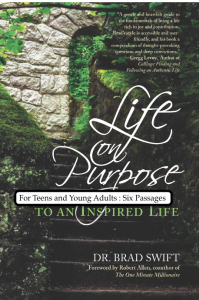
Mock up cover of new book
Two of my new Purpose Projects for next year are book-related. I shared about my second outing of creating an audiobook (Dominion Over All via ACX). The other book project that I’m excited about is my next visionary nonfiction book with the working title Life On Purpose for Teens & Young Adults. I’ve
thought for some time that it’s really unnecessary for people to wait until they’re in their forties, fifties, or older before finally getting around to clarifying their life purpose. Just imagine the difference that could be made in the world if teenagers and young adults brought such clarity of purpose to their lives?
Creating a Team of Beta Test Readers
And that’s the aim of this next book in the Life On Purpose series. I could also use your help. I’m looking for a 3-6 young beta readers betwe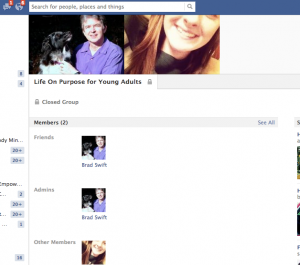 en the ages of fourteen and twenty-four. You see, while the main content of the new book will be the Life On Purpose Process, I want the book to be as entertaining and engaging as possible for people in that age range.
en the ages of fourteen and twenty-four. You see, while the main content of the new book will be the Life On Purpose Process, I want the book to be as entertaining and engaging as possible for people in that age range.
I have set up a private Facebook group where I’ll share the book chapters as I finish them for input and suggestions, so those on the beta team will be working directly with me.
I’ll also include their names in the acknowledgment section of the book and when it’s finished, each beta tester who stays with the project will receive their own autograph copy of the book along with my eternal gratitude.
If you know of someone who you feel would enjoy being a part of the team (including yourself if you’re between fourteen and twenty-four), let me know by sending me an email message to
New Beginnings – One Audio, One Written
It was a good week and a very creative one. I started two new book projects as well as starting my first pastel painting in over fifteen years. I love times like this and it’s one of the joys of being a writer.
The first project was inspired by my listening to a new audiobook by Spider Robinson, Stardance. What prompted the new project was that the book was recorded by the author. I’d enjoy recording the audio edition of one of my nonfiction books, Life On Purpose: Six Passages to an Inspired Life, and have been pleased with the results. I recently used ACX to make the audiobook available on Audible.com, Amazon, and iTunes.
But when it came to my fiction novels, I’ve been hesitant to try to record them myself…until this week. After listening to Stardance I realized an audiobook novel did not necessarily need someone who could create different voices for each character. Don’t get me wrong. I love audiobooks that are well done with a narrator with such ability. It’s just that I now realize it’s not a requirement.
Of course, not every writer should narrate their own audiobook. If your nature is to be more of a reclusive, introverted hermit with a strong shy streak within your nature, you’ll probably want to pass on such a project, but over the years I’ve become comfortable speaking in public, so feel pretty comfortable with narrating my own material as long as I don’t need to create a bunch of different voices.
 So today I started recording Dominion Over All – the first book in the Zak Bates Eco-adventure series. And at the risk of sounding egotistical, I’m really enjoying the story and the process. I plan to have it completed and submitted through ACX before I break for the Christmas holidays (though knowing me if I don’t make that deadline, I’ll probably work on it during my R&R time.)
So today I started recording Dominion Over All – the first book in the Zak Bates Eco-adventure series. And at the risk of sounding egotistical, I’m really enjoying the story and the process. I plan to have it completed and submitted through ACX before I break for the Christmas holidays (though knowing me if I don’t make that deadline, I’ll probably work on it during my R&R time.)
I’m also offering a sample of Dominion Over All Chapter 1 here.
Pre-Order and Save: If you’d like to pre-order your audiobook copy of Dominion (and thus further inspire me to get it finished), you can do so by now. When it goes on sale (audible.com, iTunes, Amazon) it will probably sell for around $15-$20. You can buy it now for just $9.95.
I’ll notify you when the book is finished and let you know how you can download the MP3 chapters.
I’ll also share about my second new book project here in the next few days. Stay tuned.
November 21, 2012
The Next Big Thing
Some indie authors (and not so indie) authors have been doing a blog-post-chain-letter thing called The Next Big Thing. It has finally reached me through my good friend and fellow author, Joseph D’Agnese. It’s an ongoing process where one writer answers a series of questions (see mine below!) about a current book or upcoming book, and then tags 5 others writers (see below 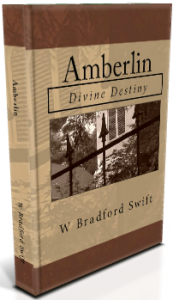 the below!) who get to do it all again the following week.
the below!) who get to do it all again the following week.
Confused? That’s okay. So was I, but don’t worry. Main thing is to read over my latest “Next Big Thing” then meet a few of my fellow author friends by clicking on the links below the questions.
1) What is the working title of your next book?
Amberlin: Divine Destiny
2) Where did the idea come from for the book?
Over my life of studying spirituality it occurred to me that most ‘enlightened beings’ have appeared on earth in a male form, like Jesus, Mohammed, Buddha, Lao Tsu, Confucius, etc. So I started to wonder what it would be like to have the next one appear in female form. After all, it seems way past due, right? So, book one is about the early years of such a being – Amberlin.
3) What genre does your book fall under?
I’d call is a Young Adult/Adult spiritual urban fantasy with paranormal overtones.
4) What actors would you choose to play the part of your characters in a movie rendition?
I’m not sure what child actor I’d have play Amberlin — maybe Dakota Fanning in her earlier days. I’d love to see a somewhat younger Hal Holbrook or maybe a slightly older Martin Sheen play Papa Herb, her protective grandfather. For her grandmother, Rose, I’d say Meryl Streep, like her role in Doubt. Missy Stover, Reverend Stover’s wife could be played by Kathy Bates, and if he was still alive, I could see Burt Lancaster recreate his Elmer Gantry role somewhat as Reverend Stover.
5) What is the one-sentence synopsis of your book?
While God’s previous trips to earth have been as male enlightened beings (Jesus, Buddha, Mohammed, Lao Tsu, Bahá’u'lláh), this go around God arrives as a female – Amberlin… and it’s about time. And the slightly longer than one sentence addition would be:
Who says the Divine doesn’t have a sense of humor? Why else would she place the first female enlightened being in a super conservative religious community like Golden Acres? Thank God (literally) for Papa Herb – Amberlin’s grandfather and mentor whose life purpose is to protect and prepare Amberlin to fulfill her divine destiny.
6) Will your book be self-published or represented by an agency?
I’ve chosen to publish it independently. It’s now available as a Kindle ebook edition and a quality paperback edition here.
7) How long did it take you to write the first draft of the manuscript?
That’s a tough one to answer because I started Amberlin back in 2005, then put it away for a while. Once I pulled it back out, it took about 9 months to finish the rough draft and another six months to revise and polish it.
8) Who or what inspired you to write this book?
As it often the case, it was a combination of things. One was the idea itself, wondering how a female enlightened being could impact the world in which we live. Also, as the co-founder of Life On Purpose Institute, I’m a big believer in the notion that we all come to this life with a ‘divine destiny’ or life purpose, so I wanted to explore that concept in a fictional story. Last of all, the idea that often times the worst evil is cloaked in good and righteous people intrigues me.
10) What else about the book might pique the reader’s interest?
Amberlin: Divine Destiny is the first book of a planned trilogy. This quote sets the tone:
Of all created beings the wickedest is one who originally stood in the immediate presence of God. ~ C. S. Lewis
And here’s the storyline:
Amberlin Gentry doesn’t feel all that special. After all, can’t everyone change the direction of a whirlpool with their mind, know the inner feelings of others by just touching them, and receive guidance from woodland creatures? Her grandfather claims she has a divine destiny to fulfill, but what do you expect him to say about the apple of his eye?
True, there’s so much work needed to bring the world back on course, but what can one small girl hope to do especially when she doesn’t have a clue what her destiny might be? Papa Herb vows not to make the same mistakes with his granddaughter that led to her mother dying in childbirth. But even with his help, following her destiny seems impossible in the radically conservative religious community where she lives, especially under the iron rule of grandmother Rose who does everything in her power to suppress Amberlin’s special gifts.
There are just so many rules you have to follow as a member of the Golden Acres of Christ Community — rules that seem contrary to her inner guidance and that make following one’s divine destiny just that much harder. Step out of line and either Reverend Stover or his wife, Missy, will read you the riot act…chapter and verse straight from the Bible, often with a stinging slap of a ruler across your knuckles.
And who is that strange woman with the angelic face that keeps visiting her dreams? Could she have a role to play in helping Amberlin follow her destiny?
Now, let me introduce you to a couple of my writer friends. Take a look at their web sites:




